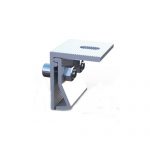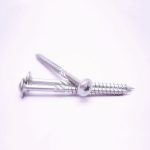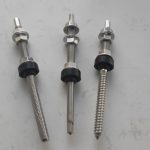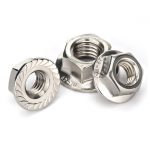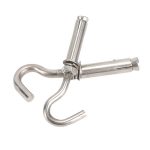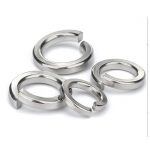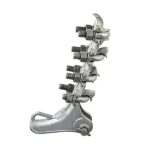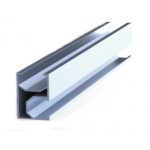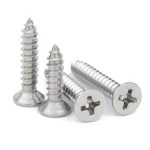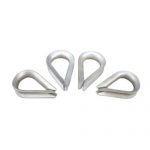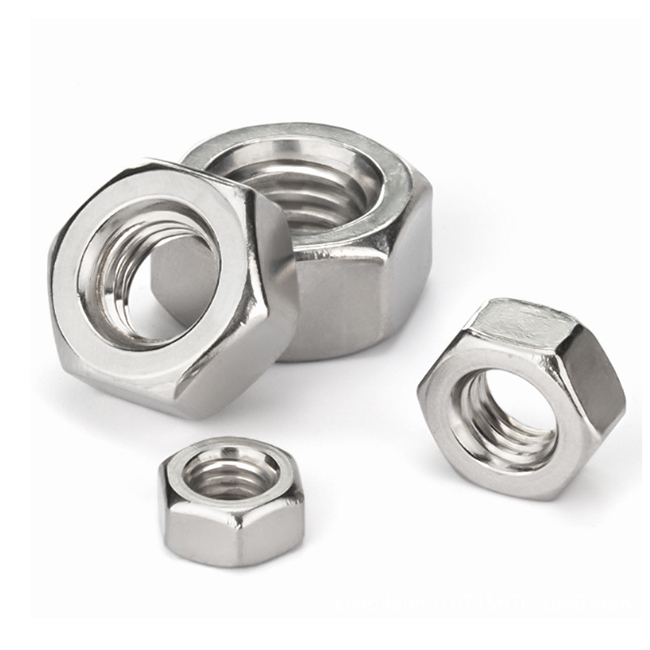
Product Description:
Standard: DIN934 /ISO4032/ASME B18.2.2
GRADE: A2-70,A4-80
Material: stainless steel A2-304,A4-316,SMO254,201,202,
Size:from #5 to 3", from M3 to M64.
Surface finish:Plain or Customized
Packing: cartons with furmigated pallets
Supply ability: 50tons per month
Assembly: normally with bolt or hex flange bolt
When it comes to fasteners, hex nuts are essential components that are used to secure bolts and screws in place. A hex nut is a six-sided nut that is commonly made of steel, stainless steel, or other metals. In this article, we will focus on stainless steel hex nuts, also known as SS hex nuts, and explore what makes them unique, their advantages and disadvantages, and how they are used in different applications.
What are Stainless Steel Hex Nuts?
Stainless steel hex nuts are nuts that have six sides and are made of stainless steel, which is an alloy of iron, chromium, and other elements. Stainless steel is known for its strength, corrosion resistance, and durability, which makes it an ideal material for fasteners. SS hex nuts are available in a range of sizes and finishes, including plain, black oxide, and zinc plated.
Types of Stainless Steel Hex Nuts
There are several types of stainless steel hex nuts available in the market, each with its unique characteristics and applications. The most common types of SS hex nuts include:
1. 18-8 Stainless Steel Hex Nuts
18-8 stainless steel hex nuts are made of an alloy that contains 18% chromium and 8% nickel. They are also known as type 304 stainless steel nuts and are commonly used in general-purpose applications. These nuts are ideal for use in environments that are not highly corrosive.
2. 316 Stainless Steel Hex Nuts
316 stainless steel hex nuts are made of an alloy that contains 16% chromium, 10% nickel, and 2% molybdenum. They are also known as marine-grade stainless steel nuts and are highly resistant to corrosion. These nuts are ideal for use in marine environments or in applications that are highly corrosive.
3. 410 Stainless Steel Hex Nuts
410 stainless steel hex nuts are made of an alloy that contains 11.5% chromium. They are also known as martensitic stainless steel nuts and are highly resistant to corrosion and heat. These nuts are ideal for use in high-temperature applications or in environments that are highly corrosive.
Advantages of Stainless Steel Hex Nuts
There are several advantages of using stainless steel hex nuts, including:
1. Corrosion Resistance
Stainless steel hex nuts are highly resistant to corrosion, which makes them ideal for use in environments that are highly corrosive, such as marine environments or in industrial applications.
2. Strength and Durability
Stainless steel hex nuts are known for their strength and durability, which makes them ideal for use in applications that require high tensile strength and resistance to wear and tear.
3. Aesthetic Appeal
Stainless steel hex nuts have a sleek and modern look that makes them ideal for use in applications where aesthetics are important, such as in the automotive industry or in architectural applications.
Disadvantages of Stainless Steel Hex Nuts
While stainless steel hex nuts have several advantages, they also have some disadvantages that need to be considered, including:
1. Cost
Stainless steel hex nuts are more expensive than other types of nuts, which can make them less cost-effective in some applications.
2. Brittle
Stainless steel hex nuts are more brittle than other types of nuts, which can make them more prone to cracking or breaking under heavy loads.
Applications of Stainless Steel Hex Nuts
Stainless steel hex nuts are used in a wide range of applications, including:
1. Automotive Industry
Stainless steel hex nuts are commonly used in the automotive industry, where they are used to secure various components in place, such as engine mounts and suspension.
2. Construction Industry
Stainless steel hex nuts are also commonly used in the construction industry, where they are used to secure building structures, such as steel beams and concrete forms.
3. Marine Industry
Stainless steel hex nuts are highly resistant to corrosion, which makes them ideal for use in marine environments, such as in boats and other watercraft.
4. Industrial Applications
Stainless steel hex nuts are commonly used in industrial applications, such as in manufacturing equipment, where they are used to secure machinery and other components in place.
5. Electrical Industry
Stainless steel hex nuts are also commonly used in the electrical industry, where they are used to secure electrical components, such as conduit fittings and wire connectors.
How to Choose the Right Stainless Steel Hex Nut
Choosing the right stainless steel hex nut depends on several factors, including the application, the environment, and the load requirements. Some of the factors to consider when choosing a stainless steel hex nut include:
1. Type of Stainless Steel
The type of stainless steel used to make the hex nut is an important factor to consider. 18-8 stainless steel hex nuts are ideal for general-purpose applications, while 316 stainless steel hex nuts are best for marine environments or highly corrosive applications.
2. Finish
The finish of the hex nut is also an important factor to consider. Plain hex nuts are suitable for most applications, while black oxide and zinc-plated hex nuts provide additional protection against corrosion.
3. Size
The size of the hex nut is also an important factor to consider. Choosing the right size hex nut ensures that it fits properly on the bolt or screw and provides the necessary clamping force.
4. Load Requirements
The load requirements of the application are also an important factor to consider. Choosing the right hex nut with the appropriate strength ensures that it can withstand the required load without failing.
Conclusion
Stainless steel hex nuts are essential components that are used to secure bolts and screws in place. They offer several advantages, including corrosion resistance, strength, and durability. However, they also have some disadvantages that need to be considered, such as cost and brittleness. Choosing the right stainless steel hex nut depends on several factors, including the application, the environment, and the load requirements.
FAQs
Are stainless steel hex nuts stronger than other types of nuts?
Stainless steel hex nuts are known for their strength and durability, making them ideal for use in applications that require high tensile strength and resistance to wear and tear.
What types of finishes are available for stainless steel hex nuts?
Stainless steel hex nuts are available in a range of finishes, including plain, black oxide, and zinc plated.
Can stainless steel hex nuts be used in marine environments?
Yes, stainless steel hex nuts are highly resistant to corrosion, making them ideal for use in marine environments.
What are the disadvantages of stainless steel hex nuts?
The disadvantages of stainless steel hex nuts include cost and brittleness.
How do I choose the right stainless steel hex nut for my application?
Choosing the right stainless steel hex nut depends on several factors, including the application, the environment, and the load requirements. Consider the type of stainless steel, finish, size, and load requirements when choosing a hex nut.

